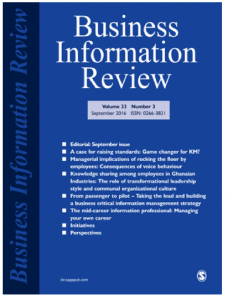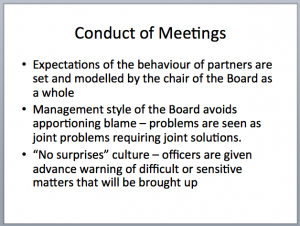 The following article was published in Business Information Review Magazine.Summary
The following article was published in Business Information Review Magazine.Summary
This article seeks to raise awareness of the moves by the International Standards Organisation (ISO) to establish a set of Knowledge Management Standards. In it the author Paul J Corney will suggest that the adoption of such standards has the potential to become a game changer for Knowledge Management professionals providing a clear rationale for future KM Programs.
A case for raising standards: home and away.
Summer has finally appeared and visitors to London can be heard bemoaning the lack of air conditioning that is commonplace in their societies where 25c is the norm rather than the exception.
The political climate too has been hot enough the past month with the Brexit vote, the flurry of resignations that accompanied it and a slew of economic forecasters downgrading short-term UK growth predictions.
The brave new dawn promised by the Vote Leave campaign is predicated on striking bilateral trade deals quickly!
Yet as anyone involved with cross border negotiations will tell you, they take time to reach consensus.
I have previous (or current). I am a member of the British Standards Institute (BSI) committee providing input to the International Standards Organisation (ISO) working party responsible for drafting.
Invited to join the ‘great and the good’ of the UK KM world a year ago, I accepted as I’d seen in assignments and tender requests how important this was becoming. But I wasn’t convinced the process would be a speedy one since the ‘call to action’ from the Israeli Standards body who were behind the proposal for a set of international KM standards was already a couple of years old.
This is how the US standards body alerted its members in 2013:
The Standards Institution of Israel (SII), Israel’s member body to the International Organization for Standardization (ISO), has submitted a proposal for a new international standard focusing on requirements for knowledge management systems.
As the U.S. member body to ISO, the American National Standards Institute (ANSI) invites all interested stakeholders to submit comments on the proposal by Friday, February 14, 2014.
The proposed International Standard would set down requirements for organizational knowledge management systems, including the creation and maintenance of such systems, the nurturing of a knowledge management culture, measurement of organizations’ knowledge, and approaches to sharing knowledge management solutions.
The standard would cover businesses, nonprofits, government organizations, and other groups of any size and in any field.
An emerging KM driver?
Is this the game changer for KM that some are predicting? Potentially and here’s why.
I am co-authoring a book. ‘Navigating the Minefield: A Practical KM Companion’ will draw on KM programs of leading firms and practitioners. My co-author Patricia Eng was previously Head of KM for the US Nuclear Regulatory Authority so knows a thing or two about making sure lessons are fed back into processes. As part of our research we asked a wide range of practitioners were the impetus for their program had come from.
A couple spoke about compliance audits being the driver a few mentioned improving productivity but the vast majority said they were addressing a business issue or risk. None pointed to adherence to a quality standard.
So in the Keynote Speeches I have been delivering this year I have been suggesting that increasingly there will be four key drivers for KM programmes:
- Strategic / Visionary
- Risk
- Process Efficiency
- Compliance with Quality Standards
The ISO standard will provide impetus to practitioner requests for KM resource. The C-Suite understands Risk and Compliance so the door is already ajar!
‘In Search of Excellence’
Followers of Tom Peters will recall this seminal work from 1982 described in Forbes Magazine as “An essential book for founders and CEO’s”.
In an excellent review of the tome published by Forbes in 2014 Scott Allison notes:
Before company culture became a well discussed topic, Tom Peters and Bob Waterman urged readers that perhaps the single key piece of advice from their findings was “figure out your value system: what your company stands for. What gives people pride?”
And it describes how excellent companies have family-like atmospheres, make a point about being transparent with and sharing information widely, and insist upon informality in communications between workers.
There’s also more open doors and open spaces instead of corner offices and cubicles.
Why this reference? Well the UAE Federal Government as well as the Dubai Government has laid out a set of excellence programmes aimed at raising the levels of service provided by their government departments.
If you visit the offices of the Knowledge & Human Development Authority in Dubai for example (they are responsible for the quality and growth of private education) you will discover that they have made extensive use of open spaces and informality. It works for them and has improved service.
Broadly aligned with those in EFQM’s Excellence Model Dubai & UAE Federal Government have added specific clauses that make reference to the delivery of Knowledge Management especially Knowledge Transfer and Learning Lessons.
As a result government entities in Dubai face periodic reviews to assess the efficacy of their KM operations. Assessors are sharpening ‘green pens’* and setting out inspection timetables as I write this.
Recognition of superior KM performance by the Dubai Government Excellence Programme is highly sought after. Failing to meet the minimum quality criteria is not!
The certification conundrum
While adherence to UAE Quality Standards is mandatory the same does not apply with ISO or EFQM.
It will be the decision of the user as to whether they wish to be certified against it – it is not a requirement.
And yet if you are a manufacturer of locomotives for example you will need the IRIS Kite mark in order to sell your engines or rolling stock. To get / maintain that Kite mark requires certification and assessment. KM is included in their standards so implicitly the manufacturer needs to be able to demonstrate that they ‘do’ KM.
And finally
Gazing into my crystal ball I am prepared to speculate that others will follow Dubai / UAE’s lead and that ISO KM Standards when released circa 2017/2018 will have an impact on KM programs. KM’ers it’s a good time to start flagging this as a potential issue!
*The pen colour of choice for auditors in the financial services sector.
References
International Organization for Standardization

 I wondered how many might turn up to mine and Andy Bent’s session in The Courtroom.
I wondered how many might turn up to mine and Andy Bent’s session in The Courtroom.
 Lauren Smith
Lauren Smith 